2026届高考英语语法二轮专题复习:专题3 形容词和副词 导学案(含答案)
文档属性
| 名称 | 2026届高考英语语法二轮专题复习:专题3 形容词和副词 导学案(含答案) |
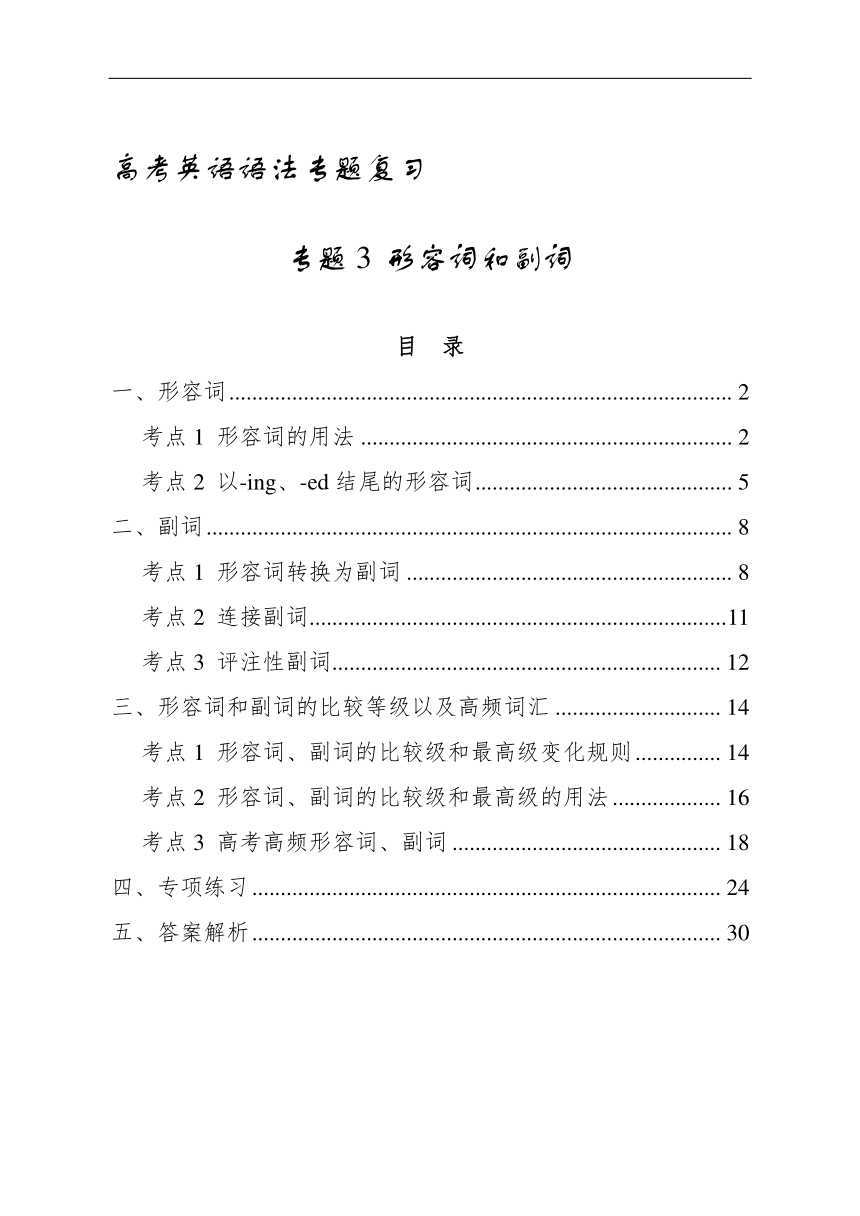
|
|
| 格式 | docx | ||
| 文件大小 | 51.1KB | ||
| 资源类型 | 教案 | ||
| 版本资源 | 人教版(2019) | ||
| 科目 | 英语 | ||
| 更新时间 | 2025-07-18 00:00:00 | ||
图片预览

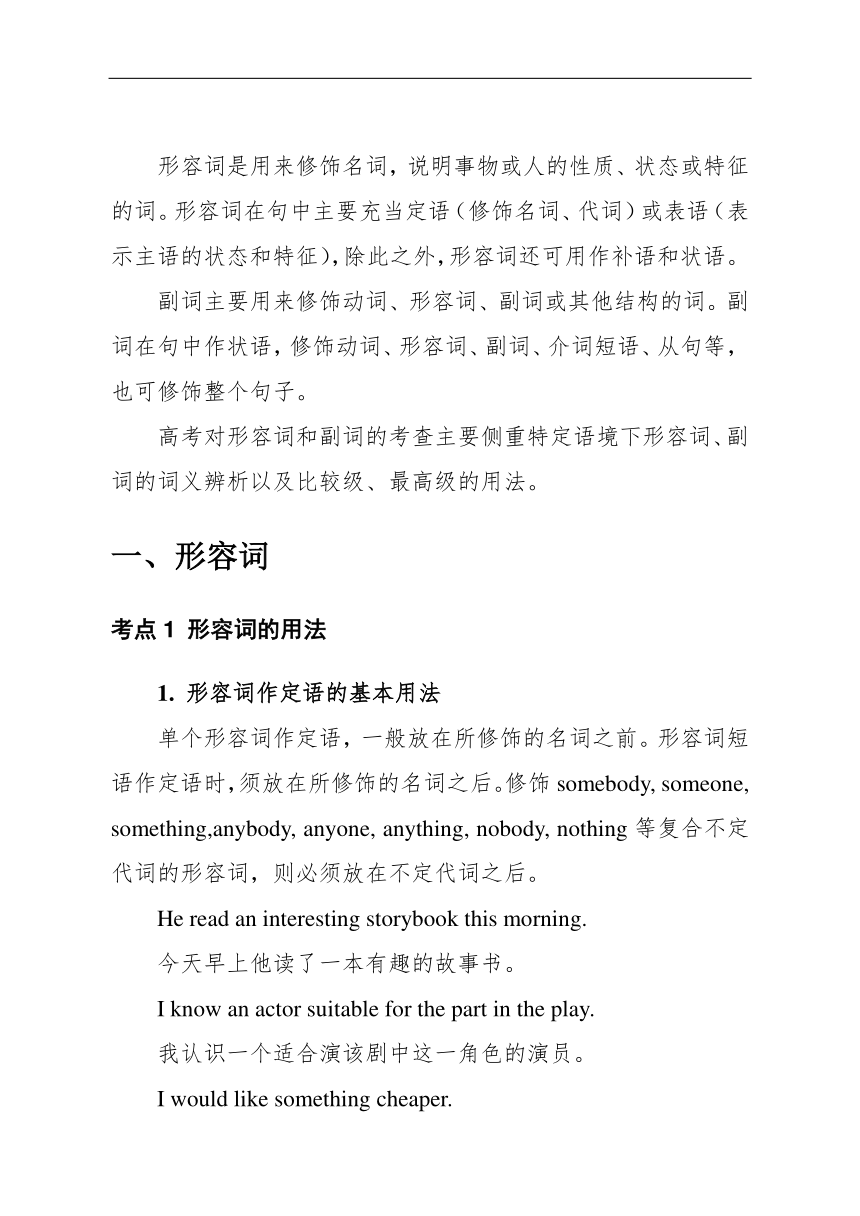
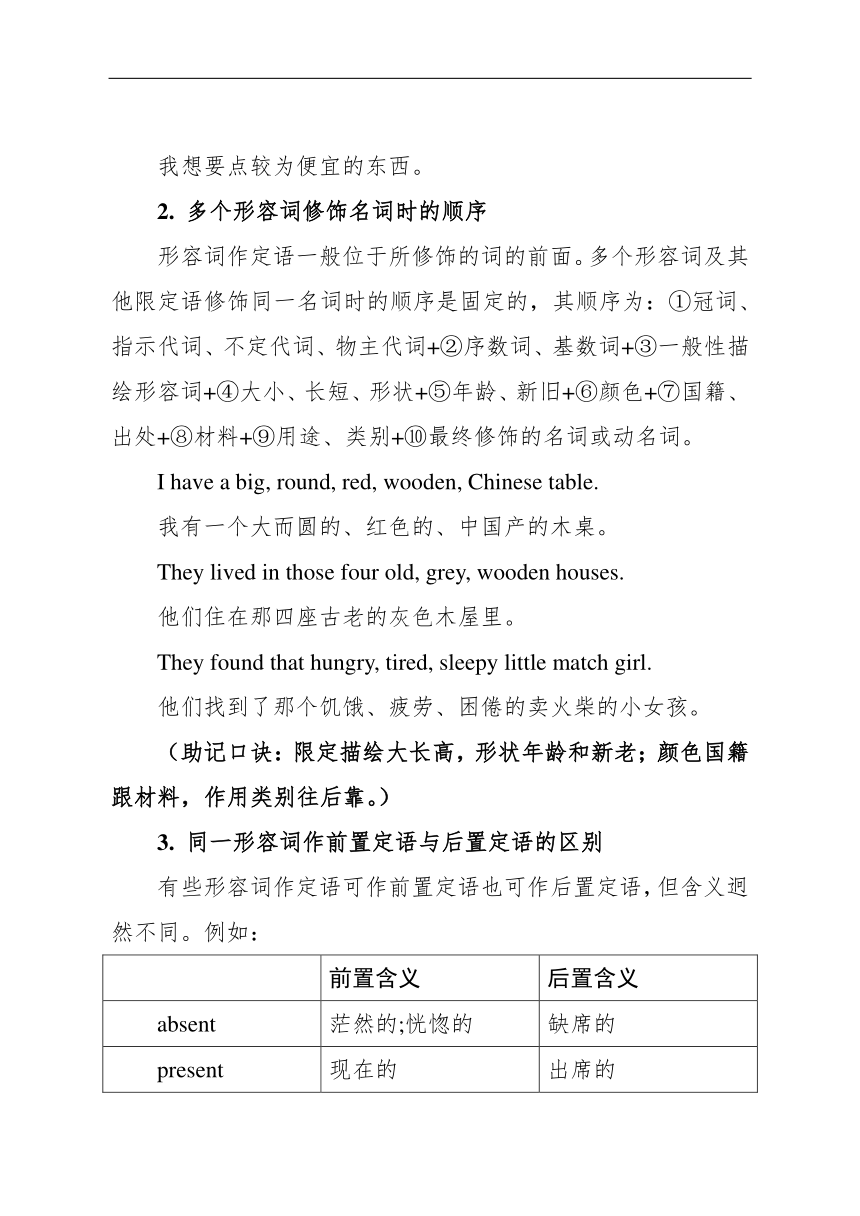
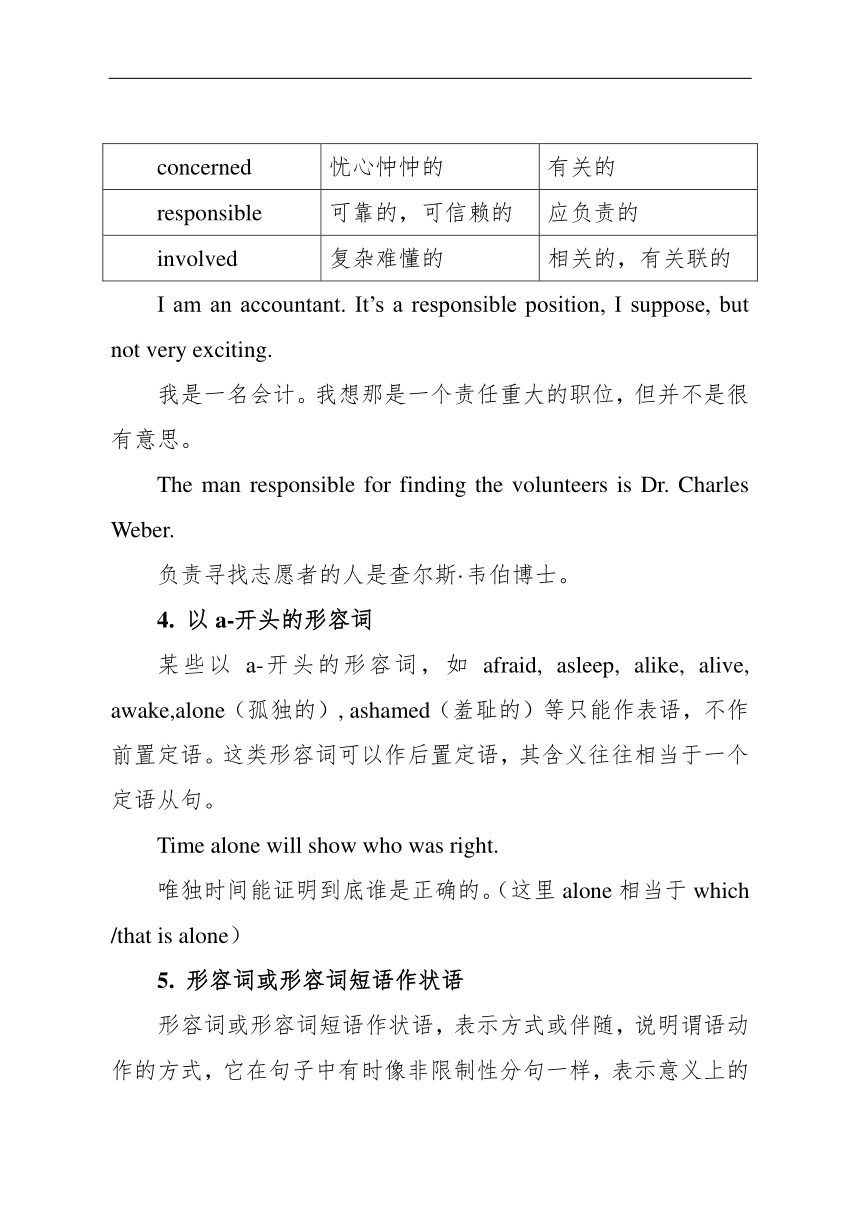
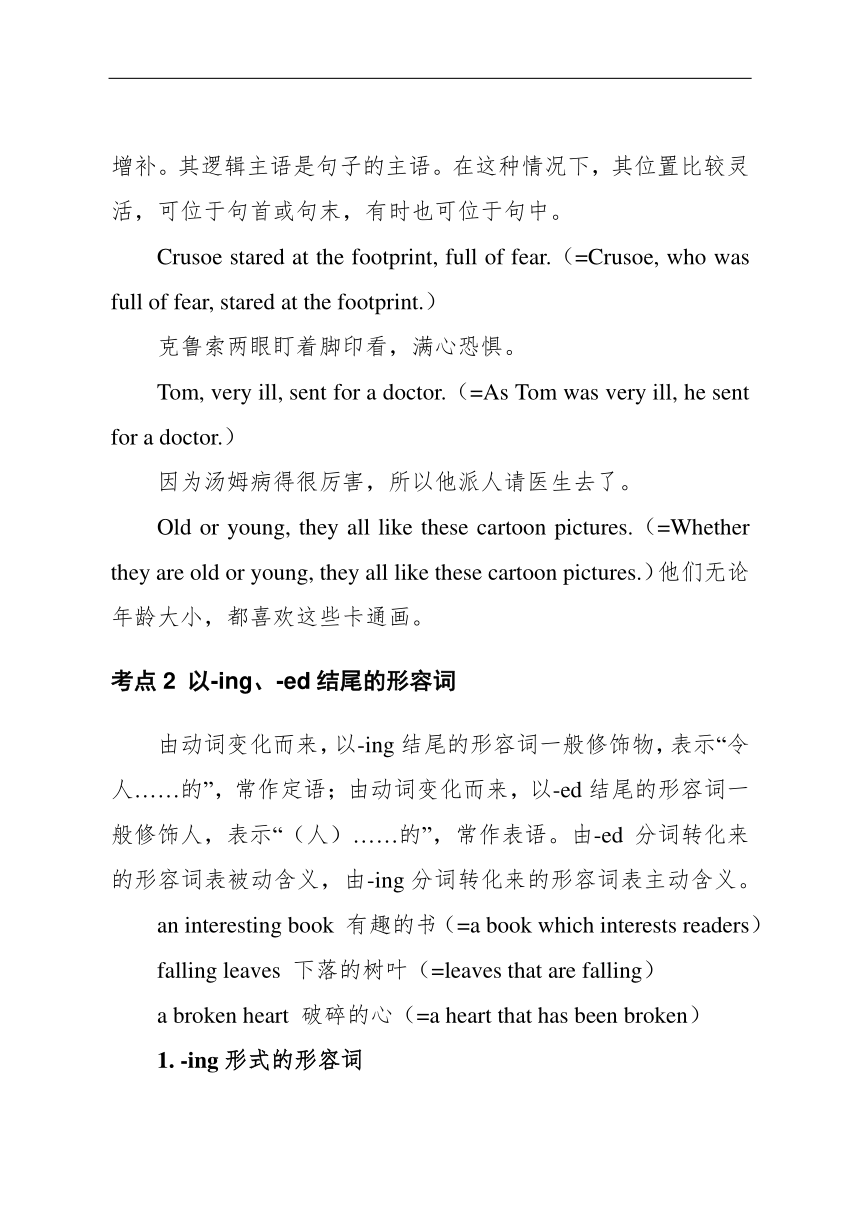
文档简介
高考英语语法专题复习
专题3 形容词和副词
目 录
一、形容词 2
考点1 形容词的用法 2
考点2 以-ing、-ed结尾的形容词 5
二、副词 8
考点1 形容词转换为副词 8
考点2 连接副词 11
考点3 评注性副词 12
三、形容词和副词的比较等级以及高频词汇 14
考点1 形容词、副词的比较级和最高级变化规则 14
考点2 形容词、副词的比较级和最高级的用法 16
考点3 高考高频形容词、副词 18
四、专项练习 24
五、答案解析 30
形容词是用来修饰名词,说明事物或人的性质、状态或特征的词。形容词在句中主要充当定语(修饰名词、代词)或表语(表示主语的状态和特征),除此之外,形容词还可用作补语和状语。
副词主要用来修饰动词、形容词、副词或其他结构的词。副词在句中作状语,修饰动词、形容词、副词、介词短语、从句等,也可修饰整个句子。
高考对形容词和副词的考查主要侧重特定语境下形容词、副词的词义辨析以及比较级、最高级的用法。
一、形容词
考点1 形容词的用法
1. 形容词作定语的基本用法
单个形容词作定语,一般放在所修饰的名词之前。形容词短语作定语时,须放在所修饰的名词之后。修饰somebody, someone, something,anybody, anyone, anything, nobody, nothing等复合不定代词的形容词,则必须放在不定代词之后。
He read an interesting storybook this morning.
今天早上他读了一本有趣的故事书。
I know an actor suitable for the part in the play.
我认识一个适合演该剧中这一角色的演员。
I would like something cheaper.
我想要点较为便宜的东西。
2. 多个形容词修饰名词时的顺序
形容词作定语一般位于所修饰的词的前面。多个形容词及其他限定语修饰同一名词时的顺序是固定的,其顺序为:①冠词、指示代词、不定代词、物主代词+②序数词、基数词+③一般性描绘形容词+④大小、长短、形状+⑤年龄、新旧+⑥颜色+⑦国籍、出处+⑧材料+⑨用途、类别+⑩最终修饰的名词或动名词。
I have a big, round, red, wooden, Chinese table.
我有一个大而圆的、红色的、中国产的木桌。
They lived in those four old, grey, wooden houses.
他们住在那四座古老的灰色木屋里。
They found that hungry, tired, sleepy little match girl.
他们找到了那个饥饿、疲劳、困倦的卖火柴的小女孩。
(助记口诀:限定描绘大长高,形状年龄和新老;颜色国籍跟材料,作用类别往后靠。)
3. 同一形容词作前置定语与后置定语的区别
有些形容词作定语可作前置定语也可作后置定语,但含义迥然不同。例如:
前置含义 后置含义
absent 茫然的;恍惚的 缺席的
present 现在的 出席的
concerned 忧心忡忡的 有关的
responsible 可靠的,可信赖的 应负责的
involved 复杂难懂的 相关的,有关联的
I am an accountant. It’s a responsible position, I suppose, but not very exciting.
我是一名会计。我想那是一个责任重大的职位,但并不是很有意思。
The man responsible for finding the volunteers is Dr. Charles Weber.
负责寻找志愿者的人是查尔斯·韦伯博士。
4. 以a-开头的形容词
某些以a-开头的形容词,如afraid, asleep, alike, alive, awake,alone(孤独的), ashamed(羞耻的)等只能作表语,不作前置定语。这类形容词可以作后置定语,其含义往往相当于一个定语从句。
Time alone will show who was right.
唯独时间能证明到底谁是正确的。(这里alone相当于which /that is alone)
5. 形容词或形容词短语作状语
形容词或形容词短语作状语,表示方式或伴随,说明谓语动作的方式,它在句子中有时像非限制性分句一样,表示意义上的增补。其逻辑主语是句子的主语。在这种情况下,其位置比较灵活,可位于句首或句末,有时也可位于句中。
Crusoe stared at the footprint, full of fear.(=Crusoe, who was full of fear, stared at the footprint.)
克鲁索两眼盯着脚印看,满心恐惧。
Tom, very ill, sent for a doctor.(=As Tom was very ill, he sent for a doctor.)
因为汤姆病得很厉害,所以他派人请医生去了。
Old or young, they all like these cartoon pictures.(=Whether they are old or young, they all like these cartoon pictures.)他们无论年龄大小,都喜欢这些卡通画。
考点2 以-ing、-ed结尾的形容词
由动词变化而来,以-ing结尾的形容词一般修饰物,表示“令人……的”,常作定语;由动词变化而来,以-ed结尾的形容词一般修饰人,表示“(人)……的”,常作表语。由-ed分词转化来的形容词表被动含义,由-ing分词转化来的形容词表主动含义。
an interesting book 有趣的书(=a book which interests readers)
falling leaves 下落的树叶(=leaves that are falling)
a broken heart 破碎的心(=a heart that has been broken)
1. -ing形式的形容词
以后缀-ing结尾的形容词作定语主要用于说明事物,表示事物的性质或特征。有时候也用它们说明人,表示此人具有此性格或特征。
The story is very interesting. 这个故事很有趣。
The man is very interesting. 这个人很有趣。
请再比较并体会以下句子:
He has a frightened look on his face. 他脸上带有惊恐的神情。
He has a frightening look on his face. 他脸上带有吓人的神情。
2. -ed形式的形容词
以后缀-ed结尾的形容词作定语通常用于说明人,不用于说明事物,若修饰事物,则该类事物多为air(神态),appearance(外貌),cry(哭声),face(表情),voice(声音),mood(情绪)等显示某人的情感状况的名词。
He had a pleased smile on his face. 他脸上露出了满意的微笑。
He told me the news in a very excited voice. 他很激动地告诉了我这个消息。
3. 以下是常见的此类形容词
amazing 令人惊异的
amazed 感到惊异的
amusing 令人愉快的
amused 感到开心的
boring 令人厌烦的
bored 感到厌烦的
confusing 令人迷惑的
confused 感到迷惑的
disappointing 令人失望的
disappointed 感到失望的
disturbing 烦人的
disturbed 受到干扰的
encouraging 令人鼓舞的
encouraged 受到鼓励的
entertaining 愉快的,有趣的
entertained 感到愉快的
freezing 冰冻的,严寒的
frozen 冻僵了的
frightening 令人害怕的
frightened 感到害怕的
inspiring 令人鼓舞的
inspired 受到鼓舞的
interesting 令人感兴趣的
interested 感兴趣的
moving 感动人的
moved 受感动的
pleasing 令人高兴的
pleased 感到高兴的
puzzling 令人不解的
puzzled 感到不解的
surprising 令人惊讶的
surprised 感到惊讶的
touching 令人感动的
touched 受感动的
worrying 令人担忧的
worried 感到担忧的
二、副词
考点1 形容词转换为副词
形容词变副词通常是在词尾加ly,但也有一些形容词变副词时需要做一些不规则变化。请记住以下口诀:一般直接加,“元e”去e加,“辅y”改i加,“le”结尾e改y。
具体说明如下:
(1)一般情况下直接加ly,如:quick-quickly; polite-politely; sadsadly; recent-recently。
(2)“元e”去e加ly,即少数以元音字母加e结尾的形容词,要去掉e再加-ly。true-truly; due-duly,而绝大多数辅音字母加e结尾的形容词直接加-ly。polite-politely; wide-widely; wise-wisely; nice-nicely。
(3)“辅y”改i加ly,即以辅音字母加y结尾的,且y的读音为/i/,先将y改成i,再加ly,如:happy-happily; heavy-heavily; angry-angrily;busy-busily,但是如果y读音为/ai/,直接加ly。dry-dryly; sly-slyly; shyshyly。
(4)“le”结尾e改y,即以辅音字母加le结尾时,去e加y。simplesimply; considerable-considerably; terrible-terribly; gentle-gently; possiblepossibly; probable-probably。
(5)以-ic结尾的词,加ally,如: economic-economically; basicbasically; scientific-scientifically; automatic-automatically; energeticenergetically。但是也有例外,如: public-publicly。
(6)以-ll结尾时,只须加y,如:full-fully;dull-dully等。
注意:有些以-ly结尾的词是形容词而非副词,例如:manly(有男子气概的),friendly(友好的),motherly(慈母般的),lovely(可爱的),monthly(月度的)。
有些形容词有两种副词形式。一种与形容词同形,另一种在形容词后面加-ly,应注意区别。举例如下:
hard 刻苦地;猛烈地;闲难地 如:work hard努力工作 hardly 几乎不 如:I hardly know her.我几乎不认识她
free免费地 如:travel free on trains坐火车免费 freely自由地;不受控制地;无拘无束地 如:travel freely between member states 在成员国内自由出行
late 晚,迟 如:3hours late 晚了三个小时 lately(=recently)最近 如:Lately,I've had trouble sleeping.最近我的睡眠有问题。
high高高地 如:He jumped high.他跳得高 highly高度地(常和praise,speak等连用) 如:think highly of高度评价
close接近地,靠近地(表示较为具体的概念 如:They live quite close.他们住得很近。 closely仔细地,密切地(常表示抽象的概念多用于修饰动词及过去分词) 如:The detective watched him closely.waiting forareply.警探紧紧注视着他,等待他回复。
direct径直地,直接地(表示实际距离,意义具体,常用来修饰动词) 如:The train goes there direct. 这趟列车直达那里。 directly 一般用于抽象,多用来修饰分词或形容词,也可修饰动词。directly还可有“立刻,马上”的意思。 如:He looked directly at us.他正视着我们。
deep(用于具体的深度,包括时间和空间:且只修饰动词) 如:They dived deep into the ocean.他们深深地潜入海中 deeply(用于抽象的、比喻的意义,可用来修饰动词、形容词、副词和分词) 如:deeply interested, indebted, impressed 极感兴趣的、极为感激的、印象极深的
wide 充分地;完全地 如:wide awake 完全清醒 widely 广泛地 如:widely used被广泛使用
注意:也有一些词虽以-ly结尾,但是形容词,如:
likely 可能的
costly 花费大的
orderly 整齐的
deadly 致命的
ugly 丑的
lively 活泼的
lonely 寂寞的;孤单的
friendly 友好的
daily 每天的
weekly 每周的
monthly 每月的
yearly 每年的
考点2 连接副词
常见的连接副词有:therefore, besides, otherwise, however, moreover,still, thus, meanwhile, nevertheless等。
以however为例,它与最常见的并列连词but起的作用是一致的,都具有转折的含义,唯一的区别在于前者是副词,后者是连词。however在句中的位置及其前后的标点符号用法为:
(1)Sentence A.+However,+Sentence B.
(2)Sentence A;+however,+Sentence B.
(3)Sentence A. Sentence B, however.
例如:
Many people believe this is right. However, John believes that is wrong.
Many people believe this is right; however, John believes that is wrong.
Many people believe this is right. John believes that is wrong, however.
(三句的含义均为:许多人认为这是对的,然而,约翰却认为这是错误的。)
而并列连词but的用法:
Sentence A,+but+Sentence B.例如:
Many people believe this is right, but John believes that is wrong.
许多人认为这是对的,但是约翰却认为这是错误的。
其他连接副词用法与however相似。
考点3 评注性副词
英语中有一些副词可用作评注性状语,用来修饰整个句子,表示说话人的态度和看问题的角度。作评注性状语的副词有三种:
(1)表示说话人的观点的副词。如:clearly(明显地),
certainly(当然),surely(无疑,当然),fortunately(幸运地),hopefully(但愿,希望),naturally(自然),obviously(显然),possibly(可能),strangely(令人奇怪地),surprisingly(出人意料地),undoubtedly(无疑)等。这类副词常可与其形容词形式相互转换。
Obviously, he’s against our plan.(=It’s obvious that he’s...)
很明显,他反对我们的计划。
Fortunately, I was in time for the interview.(=It’s fortunate that I was...)
幸运的是,我及时赶上了面试。
(2)表示说话人说话的角度的副词。如:briefly(简要地),
exactly(准确地),frankly(坦率地),generally(总体上),honestly(诚实地),roughly(大概地),seriously(严肃地)等。这类副词根据语境一般可译为“……地说”。
Exactly, you scored ninety-nine point five. 准确地说,你得了99.5分。
Honestly, I don’t like this book at all. 说老实话,我根本不喜欢这本书。
(3)表示说话人看问题的角度的副词。如:economically(经济上),historically(在历史上),physically(身体上),scientifically(科学上)等。这类副词一般表示“从……角度来说/看”。
例如:
Scientifically, the experiment was very important.
从科学的角度来说,这个实验很重要。
尝试在书面表达中恰当使用评注性副词,可以使语言连贯,更有逻辑性。
三、形容词和副词的比较等级以及高频词汇
考点1 形容词、副词的比较级和最高级变化规则
1. 直接加-er, -est的情况
一般单音节词和少数以-er,-ow结尾的双音节词,比较级在后面加-er,最高级在后面加-est。
small→smaller→smallest
short→shorter→shortest
clever→cleverer→cleverest
narrow→narrower→narrowest
2. 加-r, -st的情况
以不发音e结尾的单音节词,比较级在原级后加-r,最高级在原级后加-st。
large→larger→largest
nice→nicer→nicest
able→abler→ablest
3. 双写末尾辅音字母再加-er, -est的情况
在重读闭音节(即:辅音+元音+辅音)中,先双写末尾的辅音字母,比较级加-er,最高级加-est。
big→bigger→biggest
hot→hotter→hottest
fat→fatter→fattest
4. 把y变i后再加-er, -est的情况
以“辅音字母+y”结尾的双音节词,把y改为i,比较级加-er,最高级加-est。
easy→easier→easiest
heavy→heavier→heaviest
happy→happier→happiest
5. 双音节和多音节词的形容词、副词前加more, most
大部分双音节词和多音节词,比较级在前面加more,最高级在前面加most。
beautiful→more beautiful→most beautiful
easily→more easily→most easily
6. 其他特殊情况
另外,有少数形容词、副词的比较级和最高级是不规则的,必须熟记。
good/well→better→best
many/much→more→most
old→older/elder→oldest/eldest
little→less→least
bad/ill/badly→worse→worst
far→further/farther→furthest/farthest
注意:
① 一些词本身没有比较级和最高级形式,如:right, wrong,
complete等。
② 一些词的比较级和最高级,可以加-er或-est,也可以加
more或most,如:clever, polite等。
考点2 形容词、副词的比较级和最高级的用法
1. 形容词、副词的比较级和最高级的一般用法
(1)形容词、副词比较级的一般用法:“A+谓语动词+形容词/副词比较级+than+B”,意为“A比B更……”。
This tree is taller than that one. 这棵树比那棵树高。
Gary runs faster than Jack. 加里比杰克跑得快。
(2)形容词、副词最高级的一般用法:形容词、副词的最高级形式主要用来表示三者或三者以上人或事物的比较,表示“最……”的意思。句子中有表示范围的词或短语,如of the three, in our class等。
Tom is the smartest of the three boys. 汤姆是这三个男生中最聪明的。
Mary always comes to school earliest in our class. 我们班到校最早的总是玛丽。
注意:
① 在含有连词than的比较级中,前后的比较对象必须是同一范畴,即同类事物之间的比较。
② 在比较级前面使用a bit, a little, rather, much, far, by far,many, a lot, lots, a great deal, any, still, even表示程度。
③ very, quite一般只能修饰原级,不能修饰比较级。
2. “比较级+and+比较级”或“more and more+原级”
“比较级+and+比较级”或“more and more+原级”表示“越来越……”。
It becomes warmer and warmer when spring comes. 春天来了,天气越来越暖和了。
Our school is becoming more and more beautiful. 我们的学校变得越来越美丽。
3. “the+比较级……,the+比较级……”
“the+比较级……,the+比较级……”,表示“越……越……”。
The harder you work, the greater progress you will make. 你越用功,进步就越大。
4. 表示倍数的比较级用法
① A is... times the size/height/length/width of B.
② A is... times as big/high/long/wide/large as B.
③ A is... times larger/higher/longer/wider than B.
注意:
as... as... 作为习惯用语,有特定含义:
as long as 只要
as soon as 一……就……
as far as 远到……;据……
as well as 和,也
as good as 几乎,实际上
5. 比较级与最高级的转换
有时,比较级和最高级之间通过转换能够表达相同或类似的含义。
Mike is the most intelligent in his class. 迈克是他们班最聪明的学生。
Mike is more intelligent than any other student in his class.
迈克比他们班的其他学生都要聪明。
考点3 高考高频形容词、副词
immediate adj. 立即的,立刻的,马上
clear adj. 清楚的,清晰的
cautious adj. 小心翼翼的
vivid adj. 生动的,逼真的
exactly adv. 确切地,精确地;恰好地,正好地;(用于答语)完全
正确;的确这样
fortunately adv. 幸运地
surprisingly adv. 令人惊讶地
hardly adv. 几乎不
instead adv. 代替……;相反
properly adv. 适当地;正确地;恰当地
specially adv. 专门,特地;尤其
reliable adj. 可靠的,可信赖的
simply adv. 简单地;仅仅;简直
namely adv. 即,也就是
not nearly=far from=nowhere near 远非,远远不,一点也不
patient adj. 耐心的 n. 病人
plain adj. 简单的;朴素的
familiar adj. 熟悉的
lucky adj. 幸运的
amazing adj. 令人惊异的;了不起的
accidentally adv. 偶然地;意外地silent adj. 沉默的
calm adj. 平静的,冷静的
secret adj. 秘密的
otherwise adv. 否则
meanwhile adv. 期间,同时
besides adv. 除……以外还有
efficient adj. 高效的,有效的
flexible adj. 灵活的
complex adj. 复杂的
smooth adj. 平稳的;光滑的;顺利的
regularly adv. 定期地,有规律地
sensitive adj. 敏感的;有感知力的,能理解的
honest adj. 诚实的
confident adj. 自信的
shy adj. 害羞的,羞涩的
thoughtful adj. 深思的,沉思的;周到的,体贴的
lighthearted adj. 无忧无虑的
optimistic adj. 乐观的
nevertheless adv. 然而
private adj. 私人的
personal adj. 个人的
unique adj. 唯一的,独一无二的;独特的
favorable adj. 赞同的,有利的
precious adj. 宝贵的,珍贵的
essential adj. 必要的,重要的
worthwhile adj. 值得的
physical adj. 身体的;物理的;物质的
sudden adj. 突然的
merely=only adv. 仅仅,只
rarely adv. 罕见地
splendidly adv. 极好地;壮观地
increasingly adv. 越来越多地
naturally adv. 自然地
accurate adj. 精确的,准确的
ridiculous adj. 可笑的,荒谬的
urgent adj. 紧急的,急迫的
shallow adj. 浅的;肤浅的
frequently adv. 经常地,频繁地
especially=particularly adv. 特别地,尤其地
obviously=apparently adv. 显而易见地
necessarily adv. 必要地,必须地;必然地
generally adv. 一般地,通常地
eventually adv. 最终,最后
adoptable adv.可采用的;可收养的
acceptable adj. 可以接受的
available adj. 可利用的,可使用的;可得到的
accessible adj. 可接近的;可得到的;可进入的
relatively adv. 相对地,比较地
approximately adv. 大约
absolutely adv. 绝对地
punctual adj. 守时的
gentle adj. 温柔的
neatly adv. 整洁地
entirely adv. 完全地
highly adv. 高度地;非常
strongly adv. 强烈地,坚固地
extremely adv. 极端地;非常
reasonably adv. 合乎情理地
eagerly adv. 热切地;渴望地
badly adv. 很,非常
slightly adv. 稍微,轻微地
equally adv. 平等地
lately adv. 最近
enthusiastic adj. 热情的;热烈的;热心的
energetic adj. 精力充沛的,有活力的
talkative adj. 喜欢说话的;多嘴的;健谈的
impressive adj. 印象深刻的
traditional adj. 传统的
practical adj. 实践的,实际的
similar adj. 类似的,相似的
convenient adj. 方便的,便利的
sooner or later 迟早,早晚
more or less 或多或少,差不多,几乎
once in a while 偶尔,时不时地
now and then 偶尔,有时
willingly adv. 情愿地
unexpectedly adv. 出乎意料地
unwillingly adv. 不情愿地
unforgettable adj. 难忘的
doubtful adj. 可疑的;令人生疑的;疑心的;不能确定的
hardly=scarcely adv. 几乎不
respectable adj. 值得尊敬的
respectful adj. 恭敬的,有礼貌的
distinguished adj. 著名的;卓著的;高贵的
complicated adj. 难懂的,复杂的
awkward=clumsy adj. 笨拙的
previous adj. 以前的
四、专项练习
I. 单句改错。(仅限1处)
1. We have made greatly progress with the help of the teacher.
2. Now I’m improving my English great. And I’m getting more and more interested in learning it.
3. While waiting for the ambulance, I took off my coat to keep the old man warmly.
4. Talking with your parent more frequent, as far as I’m concerned, is good for you.
5. Your sister doesn’t look good today. Maybe she is ill.
6. The population in and around San Francisco is now ten times more than it was in 1906.
7. When they came into the room, they checked the rooms as carefully as possibly.
8. The children were exciting at the news that their parents would return from abroad.
9. The tomatoes I picked are much more redder than yours.
10. He pushed the stick deeply into the mud.
II. 在空白处填写1个适当的单词或括号内单词的正确形式。
11. There was an accident at the corner. ______(lucky), the girl wasn’t ______(bad)hurt.
12. The Yellow River is the second ______(long)river in our country.
13. He knows nothing about the matter, so he can’t tell us ______ important, I think.
14. Most of the students think a lion is much ______(dangerous)than a bear and it is the ______(dangerous)animal in the world.
15. All the students in the classroom were ______(deep)touched by his story.
16. They stayed in the snow for several days, cold and ______(tire).
17. My uncle’s house in the downtown area is much smaller than ours, but it is twice ______ expensive.
18. Not all the customers are ______(interest)in financial details.
19. ______(fortunate), I was in time for the interview.
20. These ______ children looked at the ______ tsunami with ______ eyes.(frighten)
Ⅲ. 单项选择。
21. The ukulele is a ______ instrument, which resembles a guitar.
A. Hawaiian musical small
B. small musical Hawaiian
C. Hawaiian small musical
D. small Hawaiian musical
22. —The film is, I have to say, not a bit interesting.
—But I think it’s ______ than the films I have ever seen.
A. far more interesting
B. much less interesting
C. no more interesting
D. any less interesting
23. After the long journey, the Smiths returned home, ______.
A. safe but tired
B. safely but tired
C. safe and tiring
D. safely and tiring
24. I don’t care if a hunting dog smells ______, but I really don’t want him to smell ______.
A. well; well
B. bad; bad
C. well; badly
D. badly; bad
25. When you study the local map, you’ll find this town is ______.
A. twice the size of that one
B. twice as a large town as that
C. twice as larger as that one
D. twice as larger a town as that
26. —Did you enjoy yourself at the party
—Yes. I’ve never been to ______ one before.
A. a more excited
B. the most excited
C. a more exciting
D. the most exciting
27. Let’s make it at seven o’clock on Tuesday morning at my office if ______.
A. you’re convenient
B. it is convenient for you
C. you feel convenient
D. it is convenient with you
28. ______, I managed to get through the game and the pain was worth it in the end.
A. Hopefully
B. Normally
C. Thankfully
D. Conveniently
29. Playing on a frozen sports field sounds like a lot of fun. Isn’t it rather risky, ______
A. though
B. also
C. either
D. too
30. Studies show that people are more ______ to suffer from back problems if they always sit before computer screens for long hours.
A. likely
B. possible
C. probable
D. sure
IV. 阅读下列短文,在空白处填写1个适当的单词或括号内单词的正确形式。
As the labor market becomes more 31 (attract), more companies are sending their employees to school. Fiat Chrysler Automobiles is the latest company 32 (use)tuition assistance for employees. And while the impact of such programs has yet to be 33 (full)assessed, many see it as a positive—although gradual—movement.
“For workers, it gives them a 34 (good)opportunity for development,” says Colleen Flaherty Manchester, a professor. Largely driving the trend are Millennials, who happen to be the fastest-growing people in the US workforce today and to whom the idea of tuition support from employers is 35 (especial)appealing.
Employers are 36 (absolute)adapting to Millennials in the workplace. They recognize that they need 37 (much)experience, more knowledge, more mentoring to be 38 (success). And they’re asking for it.
Of more than 140,000 Starbucks employees, only about 4,000 have signed up for the company’s College Achievement Plan. What the long-term effects such programs might have for companies’ retention and turnover rates remain unclear. 39 , the pluses(优点,益处)of these programs are 40 (important)than the minuses(不利之处). We’re going to see a lot more of this in the future.
五、答案解析
I.
1. greatly改为great 考查形容词。make great progress意为“取得重大进步”,progress为名词,需用形容词修饰。
2. great改为greatly 考查副词。此处是副词作状语,修饰现在分词improving。
3. warmly改为warm 考查形容词。此处是keep的复合结构,即“keep+宾语+形容词”。
4. frequent改为frequently 考查副词。此处是副词作状语,修饰动名词Talking。
5. good改为well考查形容词。表示“身体好”用形容词well(健康的)。
6. more改为larger 考查比较级。表示“人口比……多或少”,形容词只能用larger/smaller。
7. possibly改为possible 考查比较级。as... as possible 意为“尽可能……地”,为固定句型。
8. exciting改为excited 考查形容词。过去分词形式的形容词excited作表语意为“感到兴奋的”;现在分词形式的形容词exciting作表语意为“令人高兴的”。该句中,孩子们得知父母将回国感到很高兴,故应使用excited。
9. 去掉more 考查比较级。比较级前可以用much, even, far, a lot, a great deal等词修饰。redder本身为比较级,无需使用more。
10. deeply改为deep 考查副词。deep的意思是“深”,表示空间深度,有具体的含义;deeply时常表示感情上的深度,“深深地”,有抽象含义。
II.
11. Luckily; badly 考查副词。句意:在街角出了一起事故,幸运的是,这个小女孩受伤不严重。第一空修饰全句需用副词,第二空修饰过去分词hurt也要用副词。
12. longest 考查比较级。句意:黄河是我国第二长河。根据the second和in our country 确定应该填入long的最高级。“the+序数词+形容词最高级”表示“第几……”。
13. anything 考查形容词修饰不定代词。句意:对这件事他一无所知,因此我认为他不会告诉我们什么重要的事情。不定代词与形容词连用需后置,否定句中应该用anything而不是something。
14. more dangerous;most dangerous 考查比较级和最高级。句意:大多数学生认为狮子比熊更加危险,觉得它是世界上最危险的动物。
15. deeply考查副词。句意:教室里的所有学生都被他的故事深深地感动了。此处是副词作状语,修饰动词touch。deep也有副词词性,但是表示物理空间上的深度,而deeply表示情感方面的深度。
16. tired考查形容词作状语。句意:他们在雪地里待了几天,又冷又累。形容词或形容词短语可以作状语,表示结果和状态等。
17. as 考查倍数表达法。这里的倍数是twice,由expensive这一原级可知,这里使用了as... as...这一比较结构,在具体的语境中,后面的一个as以及后面的成分可以承前省略,即这里的expensive后面省略了as ours。
18. interested考查be interested in的搭配。句意:不是所有顾客对金融细节感兴趣。
19. Fortunately考查评注性副词作状语。考查形容词。句意:幸运的是,我及时赶上了面试。
20. frightened; frightening; frightened考查以-ing, -ed结尾的形容词的区别。句意:受惊的孩子们以惊恐的眼神看着那可怕的海啸。frightened意为“感到害怕的”,frightening 意为“令人感到害怕的”。 -ed形容词可以修饰voice, expression, look等名词,表示透过某人的声音和表情而显示出某人的内心感受。
Ⅲ.
21. D 考查多个形容词作定语的排列顺序。句意:尤克里里是夏威夷的一种小型乐器,有点像吉他。当名词前面有几个形容词作修饰语时,一般按下列次序排列:限定词+描绘形容词+形状+大小+颜色+国籍+原材料。
22. A 考查比较级。句意:——我得说,这部电影一点都不令人感兴趣。——但我觉得这可比我看过的电影有趣多了。程度副词可修饰形容词比较级,放于比较级前。根据应答者说的but...可以判断,此处应答者与前面一位说话者的看法不同,应选A。
23. A 考查形容词作状语以及动词的-ed与-ing形式在句中的用法区别。句意:经过长途旅行,史密斯夫妇安全地返回了家,很劳累。根据题干意义可知,空格部分是用来补充说明句子主语是怎样的,故选用形容词作状语,表示“人感到累”应用tired,由于选项是两个意义不一致的形容词,故用转折连词but 连接。实际上,该句相当于...the Smiths returned home and they were safe but tired。
24. D 考查形容词与副词用法。句意:我并不介意一条猎狗的嗅觉好不好,但我的确不希望它的气味难闻。此题容易误选B,认为两个smell 均为系动词,后接形容词作表语。事实上,句中的第一个smell为实义动词,意为“闻气味”,smell badly意为“嗅觉差”;第二个smell为系动词,意为“闻起来(有某种气味)”,smell bad意为“闻起来气味难闻”。
25. A 考查倍数的表达方式。句意:当你研究当地的地图时,你会发现这座城镇是那个城镇的两倍大。表示倍数可以用:A is+倍数+the+名词(如size/length)+of B,因而A项正确。B项中不定冠词位置错误,正确的应为twice as large a town as that;C、D项中as后应用形容词原级。
26. C 考查隐含式比较级。由Yes可知,“我从未参加过(比这个晚会)更令人兴奋的晚会。”指晚会是“令人兴奋的”,排除选项A和B;由语境可知是隐含式比较级:以往经历过的任何一次与这一次晚会相比,排除D。
27. B 考查形容词相关表达。容易误选A或C,因为汉语中的“如果你方便的话”直译为if you are convenient或if you feel convenient。最佳答案为B,因为英语中的convenient不是表示“感到方便的”,而是表示“使人感到方便的”,所以be convenient的主语通常不能是“人”。要表示“如果你方便的话”,英语通常采用if it is convenient for/to you,其中的介词可用for或to,一般不用with。顺便说一句,偶尔也可见到用人或物作be convenient的主语,但此时的句子必须具备这样的特点:句子主语是其后不定式的逻辑宾语,如:Mary is convenient to see on Sunday./It is convenient to see Mary on Sunday. 星期天去见玛丽较为方便。
28. C 考查副词词义辨析。句意:庆幸的是,我终于打完了比赛,其中的辛苦没有白费。hopefully充满希望地;normally正常地;thankfully庆幸地;conveniently方便地。根据句意,选C。
29. A 考查副词辨析。句意:在冰场上玩耍听起来很有趣。不过,会不会很危险呢?根据前后两句之前是明显的转折关系,所以选择though。有些副词还可以作连词,作副词时常放在句末。如:though,(ever)since, in case等。例如:He is old. He works hard,though.=Though he is old, he works hard. 虽然他年事已高,但他工作还是很努力。
30. A 考查形容词词义辨析。所填词作表语,主语是人,由more来修饰,意思是“可能”,选A。其中四个选项中possible和probable也都有“可能的”之意,但它们作表语时主语只能是物,sure在此处意思不恰当。
Ⅳ.
语篇解读:越来越多的公司送员工去学校深造。
31. attractive 考查形容词构词。此处应为形容词作表语。
32. to use 考查非谓语动词。中心词被形容词最高级或者序数词修饰,后面一般用动词不定式作定语。
33. fully 考查副词构词。此处副词作状语修饰动词。
34. better 考查形容词比较级。根据后文内容可知暗含比较。
35. especially 考查副词构词。此处副词作状语修饰动词。
36. absolutely 考查副词构词。此处副词作状语修饰动词。
37. more 考查形容词比较级。根据后文more knowledge, more mentoring可知,此处空格需填入more,与后面的内容并列。
38. successful 考查形容词构词。根据空格前的be 判断应填入success的形容词。
39. However 考查连接副词。根据上下文可知此处为转折关系。
40. more important 考查形容词比较级。根据后文than the minuses可知,此处应使用比较级。the pluses意为“有利之处”,the minuses意思是“不利之处”。
专题3 形容词和副词
目 录
一、形容词 2
考点1 形容词的用法 2
考点2 以-ing、-ed结尾的形容词 5
二、副词 8
考点1 形容词转换为副词 8
考点2 连接副词 11
考点3 评注性副词 12
三、形容词和副词的比较等级以及高频词汇 14
考点1 形容词、副词的比较级和最高级变化规则 14
考点2 形容词、副词的比较级和最高级的用法 16
考点3 高考高频形容词、副词 18
四、专项练习 24
五、答案解析 30
形容词是用来修饰名词,说明事物或人的性质、状态或特征的词。形容词在句中主要充当定语(修饰名词、代词)或表语(表示主语的状态和特征),除此之外,形容词还可用作补语和状语。
副词主要用来修饰动词、形容词、副词或其他结构的词。副词在句中作状语,修饰动词、形容词、副词、介词短语、从句等,也可修饰整个句子。
高考对形容词和副词的考查主要侧重特定语境下形容词、副词的词义辨析以及比较级、最高级的用法。
一、形容词
考点1 形容词的用法
1. 形容词作定语的基本用法
单个形容词作定语,一般放在所修饰的名词之前。形容词短语作定语时,须放在所修饰的名词之后。修饰somebody, someone, something,anybody, anyone, anything, nobody, nothing等复合不定代词的形容词,则必须放在不定代词之后。
He read an interesting storybook this morning.
今天早上他读了一本有趣的故事书。
I know an actor suitable for the part in the play.
我认识一个适合演该剧中这一角色的演员。
I would like something cheaper.
我想要点较为便宜的东西。
2. 多个形容词修饰名词时的顺序
形容词作定语一般位于所修饰的词的前面。多个形容词及其他限定语修饰同一名词时的顺序是固定的,其顺序为:①冠词、指示代词、不定代词、物主代词+②序数词、基数词+③一般性描绘形容词+④大小、长短、形状+⑤年龄、新旧+⑥颜色+⑦国籍、出处+⑧材料+⑨用途、类别+⑩最终修饰的名词或动名词。
I have a big, round, red, wooden, Chinese table.
我有一个大而圆的、红色的、中国产的木桌。
They lived in those four old, grey, wooden houses.
他们住在那四座古老的灰色木屋里。
They found that hungry, tired, sleepy little match girl.
他们找到了那个饥饿、疲劳、困倦的卖火柴的小女孩。
(助记口诀:限定描绘大长高,形状年龄和新老;颜色国籍跟材料,作用类别往后靠。)
3. 同一形容词作前置定语与后置定语的区别
有些形容词作定语可作前置定语也可作后置定语,但含义迥然不同。例如:
前置含义 后置含义
absent 茫然的;恍惚的 缺席的
present 现在的 出席的
concerned 忧心忡忡的 有关的
responsible 可靠的,可信赖的 应负责的
involved 复杂难懂的 相关的,有关联的
I am an accountant. It’s a responsible position, I suppose, but not very exciting.
我是一名会计。我想那是一个责任重大的职位,但并不是很有意思。
The man responsible for finding the volunteers is Dr. Charles Weber.
负责寻找志愿者的人是查尔斯·韦伯博士。
4. 以a-开头的形容词
某些以a-开头的形容词,如afraid, asleep, alike, alive, awake,alone(孤独的), ashamed(羞耻的)等只能作表语,不作前置定语。这类形容词可以作后置定语,其含义往往相当于一个定语从句。
Time alone will show who was right.
唯独时间能证明到底谁是正确的。(这里alone相当于which /that is alone)
5. 形容词或形容词短语作状语
形容词或形容词短语作状语,表示方式或伴随,说明谓语动作的方式,它在句子中有时像非限制性分句一样,表示意义上的增补。其逻辑主语是句子的主语。在这种情况下,其位置比较灵活,可位于句首或句末,有时也可位于句中。
Crusoe stared at the footprint, full of fear.(=Crusoe, who was full of fear, stared at the footprint.)
克鲁索两眼盯着脚印看,满心恐惧。
Tom, very ill, sent for a doctor.(=As Tom was very ill, he sent for a doctor.)
因为汤姆病得很厉害,所以他派人请医生去了。
Old or young, they all like these cartoon pictures.(=Whether they are old or young, they all like these cartoon pictures.)他们无论年龄大小,都喜欢这些卡通画。
考点2 以-ing、-ed结尾的形容词
由动词变化而来,以-ing结尾的形容词一般修饰物,表示“令人……的”,常作定语;由动词变化而来,以-ed结尾的形容词一般修饰人,表示“(人)……的”,常作表语。由-ed分词转化来的形容词表被动含义,由-ing分词转化来的形容词表主动含义。
an interesting book 有趣的书(=a book which interests readers)
falling leaves 下落的树叶(=leaves that are falling)
a broken heart 破碎的心(=a heart that has been broken)
1. -ing形式的形容词
以后缀-ing结尾的形容词作定语主要用于说明事物,表示事物的性质或特征。有时候也用它们说明人,表示此人具有此性格或特征。
The story is very interesting. 这个故事很有趣。
The man is very interesting. 这个人很有趣。
请再比较并体会以下句子:
He has a frightened look on his face. 他脸上带有惊恐的神情。
He has a frightening look on his face. 他脸上带有吓人的神情。
2. -ed形式的形容词
以后缀-ed结尾的形容词作定语通常用于说明人,不用于说明事物,若修饰事物,则该类事物多为air(神态),appearance(外貌),cry(哭声),face(表情),voice(声音),mood(情绪)等显示某人的情感状况的名词。
He had a pleased smile on his face. 他脸上露出了满意的微笑。
He told me the news in a very excited voice. 他很激动地告诉了我这个消息。
3. 以下是常见的此类形容词
amazing 令人惊异的
amazed 感到惊异的
amusing 令人愉快的
amused 感到开心的
boring 令人厌烦的
bored 感到厌烦的
confusing 令人迷惑的
confused 感到迷惑的
disappointing 令人失望的
disappointed 感到失望的
disturbing 烦人的
disturbed 受到干扰的
encouraging 令人鼓舞的
encouraged 受到鼓励的
entertaining 愉快的,有趣的
entertained 感到愉快的
freezing 冰冻的,严寒的
frozen 冻僵了的
frightening 令人害怕的
frightened 感到害怕的
inspiring 令人鼓舞的
inspired 受到鼓舞的
interesting 令人感兴趣的
interested 感兴趣的
moving 感动人的
moved 受感动的
pleasing 令人高兴的
pleased 感到高兴的
puzzling 令人不解的
puzzled 感到不解的
surprising 令人惊讶的
surprised 感到惊讶的
touching 令人感动的
touched 受感动的
worrying 令人担忧的
worried 感到担忧的
二、副词
考点1 形容词转换为副词
形容词变副词通常是在词尾加ly,但也有一些形容词变副词时需要做一些不规则变化。请记住以下口诀:一般直接加,“元e”去e加,“辅y”改i加,“le”结尾e改y。
具体说明如下:
(1)一般情况下直接加ly,如:quick-quickly; polite-politely; sadsadly; recent-recently。
(2)“元e”去e加ly,即少数以元音字母加e结尾的形容词,要去掉e再加-ly。true-truly; due-duly,而绝大多数辅音字母加e结尾的形容词直接加-ly。polite-politely; wide-widely; wise-wisely; nice-nicely。
(3)“辅y”改i加ly,即以辅音字母加y结尾的,且y的读音为/i/,先将y改成i,再加ly,如:happy-happily; heavy-heavily; angry-angrily;busy-busily,但是如果y读音为/ai/,直接加ly。dry-dryly; sly-slyly; shyshyly。
(4)“le”结尾e改y,即以辅音字母加le结尾时,去e加y。simplesimply; considerable-considerably; terrible-terribly; gentle-gently; possiblepossibly; probable-probably。
(5)以-ic结尾的词,加ally,如: economic-economically; basicbasically; scientific-scientifically; automatic-automatically; energeticenergetically。但是也有例外,如: public-publicly。
(6)以-ll结尾时,只须加y,如:full-fully;dull-dully等。
注意:有些以-ly结尾的词是形容词而非副词,例如:manly(有男子气概的),friendly(友好的),motherly(慈母般的),lovely(可爱的),monthly(月度的)。
有些形容词有两种副词形式。一种与形容词同形,另一种在形容词后面加-ly,应注意区别。举例如下:
hard 刻苦地;猛烈地;闲难地 如:work hard努力工作 hardly 几乎不 如:I hardly know her.我几乎不认识她
free免费地 如:travel free on trains坐火车免费 freely自由地;不受控制地;无拘无束地 如:travel freely between member states 在成员国内自由出行
late 晚,迟 如:3hours late 晚了三个小时 lately(=recently)最近 如:Lately,I've had trouble sleeping.最近我的睡眠有问题。
high高高地 如:He jumped high.他跳得高 highly高度地(常和praise,speak等连用) 如:think highly of高度评价
close接近地,靠近地(表示较为具体的概念 如:They live quite close.他们住得很近。 closely仔细地,密切地(常表示抽象的概念多用于修饰动词及过去分词) 如:The detective watched him closely.waiting forareply.警探紧紧注视着他,等待他回复。
direct径直地,直接地(表示实际距离,意义具体,常用来修饰动词) 如:The train goes there direct. 这趟列车直达那里。 directly 一般用于抽象,多用来修饰分词或形容词,也可修饰动词。directly还可有“立刻,马上”的意思。 如:He looked directly at us.他正视着我们。
deep(用于具体的深度,包括时间和空间:且只修饰动词) 如:They dived deep into the ocean.他们深深地潜入海中 deeply(用于抽象的、比喻的意义,可用来修饰动词、形容词、副词和分词) 如:deeply interested, indebted, impressed 极感兴趣的、极为感激的、印象极深的
wide 充分地;完全地 如:wide awake 完全清醒 widely 广泛地 如:widely used被广泛使用
注意:也有一些词虽以-ly结尾,但是形容词,如:
likely 可能的
costly 花费大的
orderly 整齐的
deadly 致命的
ugly 丑的
lively 活泼的
lonely 寂寞的;孤单的
friendly 友好的
daily 每天的
weekly 每周的
monthly 每月的
yearly 每年的
考点2 连接副词
常见的连接副词有:therefore, besides, otherwise, however, moreover,still, thus, meanwhile, nevertheless等。
以however为例,它与最常见的并列连词but起的作用是一致的,都具有转折的含义,唯一的区别在于前者是副词,后者是连词。however在句中的位置及其前后的标点符号用法为:
(1)Sentence A.+However,+Sentence B.
(2)Sentence A;+however,+Sentence B.
(3)Sentence A. Sentence B, however.
例如:
Many people believe this is right. However, John believes that is wrong.
Many people believe this is right; however, John believes that is wrong.
Many people believe this is right. John believes that is wrong, however.
(三句的含义均为:许多人认为这是对的,然而,约翰却认为这是错误的。)
而并列连词but的用法:
Sentence A,+but+Sentence B.例如:
Many people believe this is right, but John believes that is wrong.
许多人认为这是对的,但是约翰却认为这是错误的。
其他连接副词用法与however相似。
考点3 评注性副词
英语中有一些副词可用作评注性状语,用来修饰整个句子,表示说话人的态度和看问题的角度。作评注性状语的副词有三种:
(1)表示说话人的观点的副词。如:clearly(明显地),
certainly(当然),surely(无疑,当然),fortunately(幸运地),hopefully(但愿,希望),naturally(自然),obviously(显然),possibly(可能),strangely(令人奇怪地),surprisingly(出人意料地),undoubtedly(无疑)等。这类副词常可与其形容词形式相互转换。
Obviously, he’s against our plan.(=It’s obvious that he’s...)
很明显,他反对我们的计划。
Fortunately, I was in time for the interview.(=It’s fortunate that I was...)
幸运的是,我及时赶上了面试。
(2)表示说话人说话的角度的副词。如:briefly(简要地),
exactly(准确地),frankly(坦率地),generally(总体上),honestly(诚实地),roughly(大概地),seriously(严肃地)等。这类副词根据语境一般可译为“……地说”。
Exactly, you scored ninety-nine point five. 准确地说,你得了99.5分。
Honestly, I don’t like this book at all. 说老实话,我根本不喜欢这本书。
(3)表示说话人看问题的角度的副词。如:economically(经济上),historically(在历史上),physically(身体上),scientifically(科学上)等。这类副词一般表示“从……角度来说/看”。
例如:
Scientifically, the experiment was very important.
从科学的角度来说,这个实验很重要。
尝试在书面表达中恰当使用评注性副词,可以使语言连贯,更有逻辑性。
三、形容词和副词的比较等级以及高频词汇
考点1 形容词、副词的比较级和最高级变化规则
1. 直接加-er, -est的情况
一般单音节词和少数以-er,-ow结尾的双音节词,比较级在后面加-er,最高级在后面加-est。
small→smaller→smallest
short→shorter→shortest
clever→cleverer→cleverest
narrow→narrower→narrowest
2. 加-r, -st的情况
以不发音e结尾的单音节词,比较级在原级后加-r,最高级在原级后加-st。
large→larger→largest
nice→nicer→nicest
able→abler→ablest
3. 双写末尾辅音字母再加-er, -est的情况
在重读闭音节(即:辅音+元音+辅音)中,先双写末尾的辅音字母,比较级加-er,最高级加-est。
big→bigger→biggest
hot→hotter→hottest
fat→fatter→fattest
4. 把y变i后再加-er, -est的情况
以“辅音字母+y”结尾的双音节词,把y改为i,比较级加-er,最高级加-est。
easy→easier→easiest
heavy→heavier→heaviest
happy→happier→happiest
5. 双音节和多音节词的形容词、副词前加more, most
大部分双音节词和多音节词,比较级在前面加more,最高级在前面加most。
beautiful→more beautiful→most beautiful
easily→more easily→most easily
6. 其他特殊情况
另外,有少数形容词、副词的比较级和最高级是不规则的,必须熟记。
good/well→better→best
many/much→more→most
old→older/elder→oldest/eldest
little→less→least
bad/ill/badly→worse→worst
far→further/farther→furthest/farthest
注意:
① 一些词本身没有比较级和最高级形式,如:right, wrong,
complete等。
② 一些词的比较级和最高级,可以加-er或-est,也可以加
more或most,如:clever, polite等。
考点2 形容词、副词的比较级和最高级的用法
1. 形容词、副词的比较级和最高级的一般用法
(1)形容词、副词比较级的一般用法:“A+谓语动词+形容词/副词比较级+than+B”,意为“A比B更……”。
This tree is taller than that one. 这棵树比那棵树高。
Gary runs faster than Jack. 加里比杰克跑得快。
(2)形容词、副词最高级的一般用法:形容词、副词的最高级形式主要用来表示三者或三者以上人或事物的比较,表示“最……”的意思。句子中有表示范围的词或短语,如of the three, in our class等。
Tom is the smartest of the three boys. 汤姆是这三个男生中最聪明的。
Mary always comes to school earliest in our class. 我们班到校最早的总是玛丽。
注意:
① 在含有连词than的比较级中,前后的比较对象必须是同一范畴,即同类事物之间的比较。
② 在比较级前面使用a bit, a little, rather, much, far, by far,many, a lot, lots, a great deal, any, still, even表示程度。
③ very, quite一般只能修饰原级,不能修饰比较级。
2. “比较级+and+比较级”或“more and more+原级”
“比较级+and+比较级”或“more and more+原级”表示“越来越……”。
It becomes warmer and warmer when spring comes. 春天来了,天气越来越暖和了。
Our school is becoming more and more beautiful. 我们的学校变得越来越美丽。
3. “the+比较级……,the+比较级……”
“the+比较级……,the+比较级……”,表示“越……越……”。
The harder you work, the greater progress you will make. 你越用功,进步就越大。
4. 表示倍数的比较级用法
① A is... times the size/height/length/width of B.
② A is... times as big/high/long/wide/large as B.
③ A is... times larger/higher/longer/wider than B.
注意:
as... as... 作为习惯用语,有特定含义:
as long as 只要
as soon as 一……就……
as far as 远到……;据……
as well as 和,也
as good as 几乎,实际上
5. 比较级与最高级的转换
有时,比较级和最高级之间通过转换能够表达相同或类似的含义。
Mike is the most intelligent in his class. 迈克是他们班最聪明的学生。
Mike is more intelligent than any other student in his class.
迈克比他们班的其他学生都要聪明。
考点3 高考高频形容词、副词
immediate adj. 立即的,立刻的,马上
clear adj. 清楚的,清晰的
cautious adj. 小心翼翼的
vivid adj. 生动的,逼真的
exactly adv. 确切地,精确地;恰好地,正好地;(用于答语)完全
正确;的确这样
fortunately adv. 幸运地
surprisingly adv. 令人惊讶地
hardly adv. 几乎不
instead adv. 代替……;相反
properly adv. 适当地;正确地;恰当地
specially adv. 专门,特地;尤其
reliable adj. 可靠的,可信赖的
simply adv. 简单地;仅仅;简直
namely adv. 即,也就是
not nearly=far from=nowhere near 远非,远远不,一点也不
patient adj. 耐心的 n. 病人
plain adj. 简单的;朴素的
familiar adj. 熟悉的
lucky adj. 幸运的
amazing adj. 令人惊异的;了不起的
accidentally adv. 偶然地;意外地silent adj. 沉默的
calm adj. 平静的,冷静的
secret adj. 秘密的
otherwise adv. 否则
meanwhile adv. 期间,同时
besides adv. 除……以外还有
efficient adj. 高效的,有效的
flexible adj. 灵活的
complex adj. 复杂的
smooth adj. 平稳的;光滑的;顺利的
regularly adv. 定期地,有规律地
sensitive adj. 敏感的;有感知力的,能理解的
honest adj. 诚实的
confident adj. 自信的
shy adj. 害羞的,羞涩的
thoughtful adj. 深思的,沉思的;周到的,体贴的
lighthearted adj. 无忧无虑的
optimistic adj. 乐观的
nevertheless adv. 然而
private adj. 私人的
personal adj. 个人的
unique adj. 唯一的,独一无二的;独特的
favorable adj. 赞同的,有利的
precious adj. 宝贵的,珍贵的
essential adj. 必要的,重要的
worthwhile adj. 值得的
physical adj. 身体的;物理的;物质的
sudden adj. 突然的
merely=only adv. 仅仅,只
rarely adv. 罕见地
splendidly adv. 极好地;壮观地
increasingly adv. 越来越多地
naturally adv. 自然地
accurate adj. 精确的,准确的
ridiculous adj. 可笑的,荒谬的
urgent adj. 紧急的,急迫的
shallow adj. 浅的;肤浅的
frequently adv. 经常地,频繁地
especially=particularly adv. 特别地,尤其地
obviously=apparently adv. 显而易见地
necessarily adv. 必要地,必须地;必然地
generally adv. 一般地,通常地
eventually adv. 最终,最后
adoptable adv.可采用的;可收养的
acceptable adj. 可以接受的
available adj. 可利用的,可使用的;可得到的
accessible adj. 可接近的;可得到的;可进入的
relatively adv. 相对地,比较地
approximately adv. 大约
absolutely adv. 绝对地
punctual adj. 守时的
gentle adj. 温柔的
neatly adv. 整洁地
entirely adv. 完全地
highly adv. 高度地;非常
strongly adv. 强烈地,坚固地
extremely adv. 极端地;非常
reasonably adv. 合乎情理地
eagerly adv. 热切地;渴望地
badly adv. 很,非常
slightly adv. 稍微,轻微地
equally adv. 平等地
lately adv. 最近
enthusiastic adj. 热情的;热烈的;热心的
energetic adj. 精力充沛的,有活力的
talkative adj. 喜欢说话的;多嘴的;健谈的
impressive adj. 印象深刻的
traditional adj. 传统的
practical adj. 实践的,实际的
similar adj. 类似的,相似的
convenient adj. 方便的,便利的
sooner or later 迟早,早晚
more or less 或多或少,差不多,几乎
once in a while 偶尔,时不时地
now and then 偶尔,有时
willingly adv. 情愿地
unexpectedly adv. 出乎意料地
unwillingly adv. 不情愿地
unforgettable adj. 难忘的
doubtful adj. 可疑的;令人生疑的;疑心的;不能确定的
hardly=scarcely adv. 几乎不
respectable adj. 值得尊敬的
respectful adj. 恭敬的,有礼貌的
distinguished adj. 著名的;卓著的;高贵的
complicated adj. 难懂的,复杂的
awkward=clumsy adj. 笨拙的
previous adj. 以前的
四、专项练习
I. 单句改错。(仅限1处)
1. We have made greatly progress with the help of the teacher.
2. Now I’m improving my English great. And I’m getting more and more interested in learning it.
3. While waiting for the ambulance, I took off my coat to keep the old man warmly.
4. Talking with your parent more frequent, as far as I’m concerned, is good for you.
5. Your sister doesn’t look good today. Maybe she is ill.
6. The population in and around San Francisco is now ten times more than it was in 1906.
7. When they came into the room, they checked the rooms as carefully as possibly.
8. The children were exciting at the news that their parents would return from abroad.
9. The tomatoes I picked are much more redder than yours.
10. He pushed the stick deeply into the mud.
II. 在空白处填写1个适当的单词或括号内单词的正确形式。
11. There was an accident at the corner. ______(lucky), the girl wasn’t ______(bad)hurt.
12. The Yellow River is the second ______(long)river in our country.
13. He knows nothing about the matter, so he can’t tell us ______ important, I think.
14. Most of the students think a lion is much ______(dangerous)than a bear and it is the ______(dangerous)animal in the world.
15. All the students in the classroom were ______(deep)touched by his story.
16. They stayed in the snow for several days, cold and ______(tire).
17. My uncle’s house in the downtown area is much smaller than ours, but it is twice ______ expensive.
18. Not all the customers are ______(interest)in financial details.
19. ______(fortunate), I was in time for the interview.
20. These ______ children looked at the ______ tsunami with ______ eyes.(frighten)
Ⅲ. 单项选择。
21. The ukulele is a ______ instrument, which resembles a guitar.
A. Hawaiian musical small
B. small musical Hawaiian
C. Hawaiian small musical
D. small Hawaiian musical
22. —The film is, I have to say, not a bit interesting.
—But I think it’s ______ than the films I have ever seen.
A. far more interesting
B. much less interesting
C. no more interesting
D. any less interesting
23. After the long journey, the Smiths returned home, ______.
A. safe but tired
B. safely but tired
C. safe and tiring
D. safely and tiring
24. I don’t care if a hunting dog smells ______, but I really don’t want him to smell ______.
A. well; well
B. bad; bad
C. well; badly
D. badly; bad
25. When you study the local map, you’ll find this town is ______.
A. twice the size of that one
B. twice as a large town as that
C. twice as larger as that one
D. twice as larger a town as that
26. —Did you enjoy yourself at the party
—Yes. I’ve never been to ______ one before.
A. a more excited
B. the most excited
C. a more exciting
D. the most exciting
27. Let’s make it at seven o’clock on Tuesday morning at my office if ______.
A. you’re convenient
B. it is convenient for you
C. you feel convenient
D. it is convenient with you
28. ______, I managed to get through the game and the pain was worth it in the end.
A. Hopefully
B. Normally
C. Thankfully
D. Conveniently
29. Playing on a frozen sports field sounds like a lot of fun. Isn’t it rather risky, ______
A. though
B. also
C. either
D. too
30. Studies show that people are more ______ to suffer from back problems if they always sit before computer screens for long hours.
A. likely
B. possible
C. probable
D. sure
IV. 阅读下列短文,在空白处填写1个适当的单词或括号内单词的正确形式。
As the labor market becomes more 31 (attract), more companies are sending their employees to school. Fiat Chrysler Automobiles is the latest company 32 (use)tuition assistance for employees. And while the impact of such programs has yet to be 33 (full)assessed, many see it as a positive—although gradual—movement.
“For workers, it gives them a 34 (good)opportunity for development,” says Colleen Flaherty Manchester, a professor. Largely driving the trend are Millennials, who happen to be the fastest-growing people in the US workforce today and to whom the idea of tuition support from employers is 35 (especial)appealing.
Employers are 36 (absolute)adapting to Millennials in the workplace. They recognize that they need 37 (much)experience, more knowledge, more mentoring to be 38 (success). And they’re asking for it.
Of more than 140,000 Starbucks employees, only about 4,000 have signed up for the company’s College Achievement Plan. What the long-term effects such programs might have for companies’ retention and turnover rates remain unclear. 39 , the pluses(优点,益处)of these programs are 40 (important)than the minuses(不利之处). We’re going to see a lot more of this in the future.
五、答案解析
I.
1. greatly改为great 考查形容词。make great progress意为“取得重大进步”,progress为名词,需用形容词修饰。
2. great改为greatly 考查副词。此处是副词作状语,修饰现在分词improving。
3. warmly改为warm 考查形容词。此处是keep的复合结构,即“keep+宾语+形容词”。
4. frequent改为frequently 考查副词。此处是副词作状语,修饰动名词Talking。
5. good改为well考查形容词。表示“身体好”用形容词well(健康的)。
6. more改为larger 考查比较级。表示“人口比……多或少”,形容词只能用larger/smaller。
7. possibly改为possible 考查比较级。as... as possible 意为“尽可能……地”,为固定句型。
8. exciting改为excited 考查形容词。过去分词形式的形容词excited作表语意为“感到兴奋的”;现在分词形式的形容词exciting作表语意为“令人高兴的”。该句中,孩子们得知父母将回国感到很高兴,故应使用excited。
9. 去掉more 考查比较级。比较级前可以用much, even, far, a lot, a great deal等词修饰。redder本身为比较级,无需使用more。
10. deeply改为deep 考查副词。deep的意思是“深”,表示空间深度,有具体的含义;deeply时常表示感情上的深度,“深深地”,有抽象含义。
II.
11. Luckily; badly 考查副词。句意:在街角出了一起事故,幸运的是,这个小女孩受伤不严重。第一空修饰全句需用副词,第二空修饰过去分词hurt也要用副词。
12. longest 考查比较级。句意:黄河是我国第二长河。根据the second和in our country 确定应该填入long的最高级。“the+序数词+形容词最高级”表示“第几……”。
13. anything 考查形容词修饰不定代词。句意:对这件事他一无所知,因此我认为他不会告诉我们什么重要的事情。不定代词与形容词连用需后置,否定句中应该用anything而不是something。
14. more dangerous;most dangerous 考查比较级和最高级。句意:大多数学生认为狮子比熊更加危险,觉得它是世界上最危险的动物。
15. deeply考查副词。句意:教室里的所有学生都被他的故事深深地感动了。此处是副词作状语,修饰动词touch。deep也有副词词性,但是表示物理空间上的深度,而deeply表示情感方面的深度。
16. tired考查形容词作状语。句意:他们在雪地里待了几天,又冷又累。形容词或形容词短语可以作状语,表示结果和状态等。
17. as 考查倍数表达法。这里的倍数是twice,由expensive这一原级可知,这里使用了as... as...这一比较结构,在具体的语境中,后面的一个as以及后面的成分可以承前省略,即这里的expensive后面省略了as ours。
18. interested考查be interested in的搭配。句意:不是所有顾客对金融细节感兴趣。
19. Fortunately考查评注性副词作状语。考查形容词。句意:幸运的是,我及时赶上了面试。
20. frightened; frightening; frightened考查以-ing, -ed结尾的形容词的区别。句意:受惊的孩子们以惊恐的眼神看着那可怕的海啸。frightened意为“感到害怕的”,frightening 意为“令人感到害怕的”。 -ed形容词可以修饰voice, expression, look等名词,表示透过某人的声音和表情而显示出某人的内心感受。
Ⅲ.
21. D 考查多个形容词作定语的排列顺序。句意:尤克里里是夏威夷的一种小型乐器,有点像吉他。当名词前面有几个形容词作修饰语时,一般按下列次序排列:限定词+描绘形容词+形状+大小+颜色+国籍+原材料。
22. A 考查比较级。句意:——我得说,这部电影一点都不令人感兴趣。——但我觉得这可比我看过的电影有趣多了。程度副词可修饰形容词比较级,放于比较级前。根据应答者说的but...可以判断,此处应答者与前面一位说话者的看法不同,应选A。
23. A 考查形容词作状语以及动词的-ed与-ing形式在句中的用法区别。句意:经过长途旅行,史密斯夫妇安全地返回了家,很劳累。根据题干意义可知,空格部分是用来补充说明句子主语是怎样的,故选用形容词作状语,表示“人感到累”应用tired,由于选项是两个意义不一致的形容词,故用转折连词but 连接。实际上,该句相当于...the Smiths returned home and they were safe but tired。
24. D 考查形容词与副词用法。句意:我并不介意一条猎狗的嗅觉好不好,但我的确不希望它的气味难闻。此题容易误选B,认为两个smell 均为系动词,后接形容词作表语。事实上,句中的第一个smell为实义动词,意为“闻气味”,smell badly意为“嗅觉差”;第二个smell为系动词,意为“闻起来(有某种气味)”,smell bad意为“闻起来气味难闻”。
25. A 考查倍数的表达方式。句意:当你研究当地的地图时,你会发现这座城镇是那个城镇的两倍大。表示倍数可以用:A is+倍数+the+名词(如size/length)+of B,因而A项正确。B项中不定冠词位置错误,正确的应为twice as large a town as that;C、D项中as后应用形容词原级。
26. C 考查隐含式比较级。由Yes可知,“我从未参加过(比这个晚会)更令人兴奋的晚会。”指晚会是“令人兴奋的”,排除选项A和B;由语境可知是隐含式比较级:以往经历过的任何一次与这一次晚会相比,排除D。
27. B 考查形容词相关表达。容易误选A或C,因为汉语中的“如果你方便的话”直译为if you are convenient或if you feel convenient。最佳答案为B,因为英语中的convenient不是表示“感到方便的”,而是表示“使人感到方便的”,所以be convenient的主语通常不能是“人”。要表示“如果你方便的话”,英语通常采用if it is convenient for/to you,其中的介词可用for或to,一般不用with。顺便说一句,偶尔也可见到用人或物作be convenient的主语,但此时的句子必须具备这样的特点:句子主语是其后不定式的逻辑宾语,如:Mary is convenient to see on Sunday./It is convenient to see Mary on Sunday. 星期天去见玛丽较为方便。
28. C 考查副词词义辨析。句意:庆幸的是,我终于打完了比赛,其中的辛苦没有白费。hopefully充满希望地;normally正常地;thankfully庆幸地;conveniently方便地。根据句意,选C。
29. A 考查副词辨析。句意:在冰场上玩耍听起来很有趣。不过,会不会很危险呢?根据前后两句之前是明显的转折关系,所以选择though。有些副词还可以作连词,作副词时常放在句末。如:though,(ever)since, in case等。例如:He is old. He works hard,though.=Though he is old, he works hard. 虽然他年事已高,但他工作还是很努力。
30. A 考查形容词词义辨析。所填词作表语,主语是人,由more来修饰,意思是“可能”,选A。其中四个选项中possible和probable也都有“可能的”之意,但它们作表语时主语只能是物,sure在此处意思不恰当。
Ⅳ.
语篇解读:越来越多的公司送员工去学校深造。
31. attractive 考查形容词构词。此处应为形容词作表语。
32. to use 考查非谓语动词。中心词被形容词最高级或者序数词修饰,后面一般用动词不定式作定语。
33. fully 考查副词构词。此处副词作状语修饰动词。
34. better 考查形容词比较级。根据后文内容可知暗含比较。
35. especially 考查副词构词。此处副词作状语修饰动词。
36. absolutely 考查副词构词。此处副词作状语修饰动词。
37. more 考查形容词比较级。根据后文more knowledge, more mentoring可知,此处空格需填入more,与后面的内容并列。
38. successful 考查形容词构词。根据空格前的be 判断应填入success的形容词。
39. However 考查连接副词。根据上下文可知此处为转折关系。
40. more important 考查形容词比较级。根据后文than the minuses可知,此处应使用比较级。the pluses意为“有利之处”,the minuses意思是“不利之处”。
